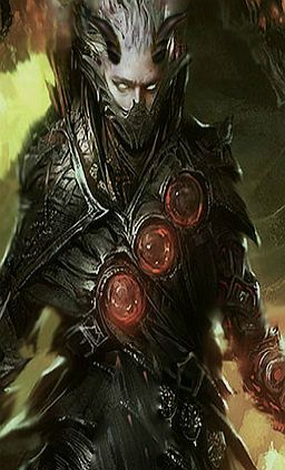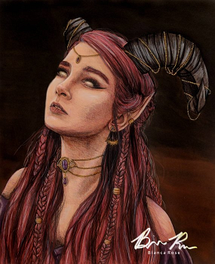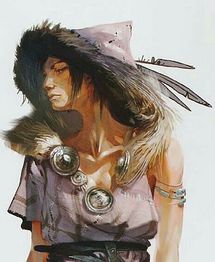Carrion Sùil-taibhsear
WIP FUTURE CHARACTER; this is for planning.
[...]
| Carrion | |||||||
| Male Tiefling | |||||||
| Player: SamB123 | |||||||

|
| General Information | ||||||||||
| Full Name: | Carrion Sùil~taibhsear | |||||||||
| Nicknames: | Ardhem | |||||||||
| Age: | 27 | |||||||||
| Deity: | Math Mathonwy[1], Morrigan[2] | |||||||||
| Alignment: |
| |||||||||
| Occupation: | Warrior-Scholar, former gladiator | |||||||||
| Faction/Rank: | Sign of One / Namer | |||||||||
| Place of Birth: | Ag Streachailt | |||||||||
| Physical Attributes | ||||||||||
| Height: | 1.8m | |||||||||
| Weight: | 75kg | |||||||||
| Eyes: | Luminous, yellow | |||||||||
| Hair: | Platinum blonde | |||||||||
| Complexion: | Pallid, ash-gray | |||||||||
| Physical Build: | Lithe, strong; Ectomorph[3] | |||||||||
| Physical Features: | See "Aspect" section. | |||||||||
| Skills | ||||||||||
| Knowledge of the arcane and of the planes, intimidating and deceitful, skilled at deciphering writing and glyphs, able to focus his mind well. | ||||||||||
| Equipment and Items | ||||||||||
| Greatsword, Warhammer | ||||||||||
Disposition
Trait
I live by my wits, adapting to the milieu and cultivating power.
Ideal
Though I may not know their ways, neither do they know mine, which can be to my advantage.
Bond
My freedom is my most precious possession. I'll never let anyone take it from me again.
Flaws
I have a weakness for the exotic beauty of female fiends and tieflings.
I never show charity, believing it to be "unselfish love".
Carrion Sùil~taibhsear is a tiefling with definite presence. Always polite, he seems to fill more than just the space he occupies. Whatever it is, the Celtic tiefling also has a darkness about him. There's an almost enticing sense of danger about him.
Carrion doesn't seem too fond of most priests or paladins, but he's obviously not an Athar. In fact, he freely admits to worshiping both Math Mathonwy and The Morrígan. The tiefling's demeanor is charming, and his attitude pragmatic. Carrion sneers at the ideals of love and charity, but he embraces the virtues of artifice and adroitness, as well skill at arms. Cruel as needed and kind when desired, he never lets anything interfere with his goals.
Aspect
Carrion Sùil~taibhsear is obviously a tiefling. Pointed ears, coupled with an ophidian tail, show his fiendish image. Luminous, yellow eyes peer at you, in a pragmatic gaze. Along his torso, there are patches of scale-like skin. The tiefling's platinum, short hair is slicked back with lime-water, and his beard is well-trimmed. You might see a tattoo stretching across his right shoulder, neck, and chest, depicting a badger, a raven, and a Triskelion[4] ; and a tattoo on the bridge of his nose, depicting the Awen[5].
Carrion outfits himself in Celtic garb. The tiefling's casual garbs includes tartan cloak, stylized tunic, and Bracae trousers. His armor is comprises a brigandine, armor lined with small steel plates; over which is worn a leather gorget/mask, a pauldron and a spiked, leather spaulder. A wool tunic and a sword harness completes the armor. In either outfit, Carrion dons a leather vambrace and a torc.
The Cruithne of Ag Streachailt
The small Prime of Ag Streachailt, roughly Celtic for "to struggle", is mostly inhabited by humans. The Celtic peoples there call themselves Cruithne, and they are opposed by a Hunnic seafaring people known as Moryatsi. Ag Streachailt is a verdant, temperate world. The lands of the Cruithne contain rolling hillocks, beautiful rivers and lakes, sylvan groves, and lofty escarpments. North of the Celtic lands, antediluvian forests lead to great mountains, covered in ice, that act as the dome of the world. The Cruithne are careful only to farm what land they need and only to hunt what game is abundant.
Conversely, the lands of the Moryatsi are mostly tropical islands, largely unexplored by the Celts, and only the Huns know what lies further south. It is rumored that there are formerly dominant peoples in the furthermost reaches of the world: the aes sídhe[6], Fey-like spirits of the swamps and rivers, and the al-ghuûl[7], beast-like men who eat flesh.
Religion is very important part of the lives of the Cruithne. The Cruithne chiefly worship the Celtic Pantheon, especially the Daghdha. The priesthood consists of the druis, the vates, and the filí. The druis act as intermediaries between the Celtic gods and the Celts themselves, leading prayers, opening Holy Days with rituals of human sacrifice, and caring for the general needs of the Celts. There is great rivalry among the druis orders of the various Celtic gods, mitigated by each druí order's communal role.
The vates are nubile, female oracles, voluntarily isolated by the druis of Arawn and Math Mathonwy. The visions of the vates are triggered by fornication; and many vates consider it an honor to copulate with the druis of Arawn and Math Mathonwy, but dread to do so with a half-fiend. The itinerant filí are storytellers, maestros, and educators: teaching literature, mathematics, politics, and, most importantly, military strategy. Filí are said to have no home, though many have a "favored range"; advise the Cruithne freemen in peacetime; and rarely handfast.
The Cruithne are ruled by dozens of Ard Rí (Kings) and Banríon (Queens), each of whom rule several clann (clans); and by the tighearna (lords) who rule the treibhe (clann regions) from their duns (hill forts). The ard rí and banríon meet every season at the comhdháil, held by lottery at one of their demenses. These demenses contain one or more walled hilltop cities, guarded by the armies of the clanns and the caislighs (royal fortress-palaces). The meetings of the comhdháil are held on Holy Days: Samhain, end of the harvest and beginning of winter; Imbolc, beginning of spring; Bealtaine, halfway between spring equinox and summer solstice; and Lughnasadh, beginning of harvest season. During wartime, the ard rí and banríon are advised by the filí - often, for an ample price! Individual ard rí and banríon are picked at the behest of the druí and are treated as stewards for the gods, sanctioned to handfast several consorts.
The freemen among the Cruithne are the farmers, the hunters, and the tradesmen who reside within the clann regions. Men and women engage in handfast, but this does not legally preclude fornication with others besides their spouse. All Cruithne, both men and women, train as warriors and are conscripted, by lots, into the armies of the clann. Beneath the freemen are the daor, debt-slaves and prisoners of war, who serve at the whims of the lord and maintain the hill forts. Slaves are not permitted to handfast and are forbidden spear or sword, but neither can the lords abuse them. Both slaves and freemen live in thatched huts, although the freemen have no restrictions on their familial possessions.
Tieflings and aasimars are rare but not unknown. Most enjoy special status as children of the druis. Tiefling bloodlines are the result of the distasteful mating of a half-fiend with a vates. When it is known that a vates has borne a tiefling child, the half-fiend father is killed, and the vates is permitted to become a druis. Tieflings descended from these bloodlines are usually the privileged children of the priests of the evil Celtic gods. As a countermeasure to the minor fiendish influence in Cruithne society, many female druis of Belenus and Brigantia seek to lie with those aasimon who serve these two gods. Aasimar of these bloodlines tend to become famous ard rí and banríon, considered blessed by the gods.
The Celts know very little of the Hunnic Moryatsi, but some facts have been gleaned from the rare Hunnic slave. The Moryatsi are ruled by sorcerer-kings, known as krals. The krals are at constant warfare with each other and with the Cruithne. These swarthy-skinned southerners worship Fiends and view the summoning of Tanar'ri and Yugoloths of Khin-Oin as a religious obligation. Bounds Fiends are their favorite weapons, and these fiends desire to rape Cruithne women, and will - if the battle goes ill for the Celts! Any resulting Fiendish issue are neglected by the Moryatsi in Celtic lands, then invariably imprisoned by the druí of Arawn and Math Mathonwy.
These Hunnic islanders are accomplished shipwrights and frequently raid the lands of their northern neighbors. Cruithne youths and maidens (as breeding slaves), precious metals, and furs are much coveted by the Moryatsi sorcerer-kings. It is whispered that the islands of the south are barren (truthfully, the islands are not), and so the bloodthirsty krals seek to constantly reinvigorate their rule with successful raids (which they do). Such raids are, of course, not always successful. Furthermore, vates who flee their voluntary isolation - a very sporadic event - have been known to join Moryatsi, and these vates become corrupted by sorcery. Centuries of conflict between these two cultures has only widened the gaps of misunderstanding and hatred.
Backstory
Carrion Sùil~taibhsear, the tiefling , relaxes near the statue of Kali within IX and sips blood wine. He had recently come to Sigil, after a few years as a gladiator. Tomorrow, he was to meet with a Sign of One representative and demonstrate a vision as part of his entry into the faction. Tonight, he marked the time and slipped into memories. It had been several months since he had been a gladiator in Torch...
There are four gladiators in the Soul-Mob Scourge squad: Carrion, the Celtic tiefling "striker", armed with a greatsword or hammer; Meldir, a tricky Deurgar warrior, armed with longsword and shield; Little Soldier, a mephling "snarer", who used a whip and a dagger; Vapor, an odoriferous, obese human "muscle", who wore weighted boxing gloves; and Jinx-of-Desire, a tiefling "gladiatrix" and Carrion's mistress, who wielded a curved sica sword[8]. The arena was located in the middle ground of Maygel, past all the sales pitches and pickpockets.
The Soul-Mob Scourge had been in several successful matches, and the squad knew their work! Today was no different. Jinx-of-Desire was the honey trap, who lured opponents away from their formation. Then, Little Soldier would flank them, while Carrion and Vapor would hit them from the side or from behind - a classic hammer and anvil attack. Their opponents, a mix of duergar and Githzerai, fell for it beautifully. The crowd cheered when the maneuver worked, and the squad bowed before they left the arena.

After the match, they return to their kip and divide up the gelt. Little Soldier, Meldir, and Vapor headed to the tavern. He and Jinx-of-Desire enjoyed wine and then each other's bodies, as was their wont after a match. Of course, as gladiators, both had varied partners and fancies; but a match always saw them alone together, exultant in their lust. There was just something about the adrenaline rush of combat, which made Jinx-of-Desire ravishing!
The next match was a bait-and-switch. The Soul-Mob Scourge was told they would be fighting some elves. When they entered the arena on Maygel, the squattest of Torch's mountains, what greeted the Soul-Mob was ...a gehreleth. The tall, slender farastu took one look at Vapor, and then crushed the fat man's head. Carrion struck the farastu with his greatsword, and the weapon stuck to the creature. The next strike of the gehreleth knocked Carrion out.
When Carrion awoke, the tiefling was told that he had survived the farastu, but the most of his squad had not. Meldir had killed the farastu, but not before it killed the others. Jinx-of-Desire's body was so crushed, apparently, that nothing but paste was left. The loss of his mistress caused a cruel, smoldering rage in Carrion. He pondered whether it worth losing friend for years, until he died himself, the forgotten slave of a gladiator school. After a few days of recovery and mourning, Carrion left and walked... past the Blood Swamps, straight into the Portal to Sigil!
Carrion sips more blood wine, ordering another flagon as he does so. The musicians start to play, but the tiefling is still lost in his memories. Trying to mentally surpress the flood of pain, Carrion considers his father, once a druis of Arawn, and the reason both ended up in the gate-town of Torch.

The young tiefling man, Ardhem (later known as Carrion), sat listening, ignored by the two arguing druis. The first was his father, Dughall, and the second was the an-druis, the high priest, of the North Temple of Arawn. The men's raised voices lashed against the stones of the monoliths and the menhirs of the open-air henge, echoing off of the stiles rising to the enclosed dais and altar. Other druis, several men and a few women, stood listening, awaiting the final decision of the an-druis.
"You cannot do this, Dughall! Arawn will NOT permit it. A vates can never be raised."
"I must do it, An-druis Elgine... Tamra was handfasted to me, and bore my son!"
"And blessed were you that your handfasted was a vates, and your son, Ardhem, was born a diabhal, a gift from our god to one of his priests and the priest's chosen carnal oracle! ...But Arawn has taken her!"
"I MUST BRING HER BACK, An-druis Elgine!" Dughall roared.
"Then, you do it without my blessing..."
Lost in his own thoughts, Ardhem barely heard the unremitting argument between the two druis. They had been at it for over an hour, and the last ray of the sunset gleamed through the central menhir.
The sunbeam streamed up to the dais, lighting upon the body of his mother, the departed vates, Tamra. Her brown hair and fair-skinned face were briefly illuminated by this last sunbeam. Even in death, her beauty shown through; her body mature, but still ripe for childbearing. Tamra would lie preserved, by the arts of the druis, in a burial shroud. The body of a vates is preserved for three months and would not decay, until burial. For now, his mother wore a diaphanous frock and a thick shawl.
For two decades, Ardhem's father was handfasted to her, and out of their unions had come poignant visions and had come Cemoc, a diabhal, a tiefling. Ardhem was their only child, and he knew the druis of Arawn considered their family to blessed. At the moment, the tiefling of seventeen summers didn't feel 'blessed'; all he felt was... a distant pain.
Ardhem barely registered it, as Dughall beckoned. Father and son left the temple, in silence. The young tiefling silent in grief, and the older man silent in quiet rage...
Several weeks had passed since the day at the temple. Ardhem tried to assuage his own grief by soliciting Cíche, a young filí-in-training. Their relationship would never become a handfast, but Cíche was more than eager to casually mate with a diabhal. She was a comfort to him.
As was his latest wont, the tiefling spent the night at Cíche's comfortable hovel. The two finished copulation, and Ardhem ran his hand across her bare rump, satisfied. She nibbled her bottom lip, her eyes smiling at him. Just then, there was a rackety hammering came on the door of the hovel!
"ARDHEM! I found the solution!" his father bellowed.
Sighing, Ardhem rose and opened the door. The temperate spring air wafted in, mixing with the heat of the fireplace. He grabbed his bracae trousers, glared at his father, and then looked over to see Cíche sliding a shawl over her shoulders.
Stepping into his trousers, he grunted, "The solution to what, father?"
"I can resurrect your mother tomorrow night, the night before Bealtaine!" Dughall beamed, while both Ardhem and Cíche stared in shock.
The next night, Dughall bore Tamra's body to a clearing in the forest. Still in shock, but obedient to his father, Ardhem brought the firewood and lit it in the clearing. The druis unwrapped her body from the burial shroud. His father began the resurrection ritual...
An hour later, with final chant, Dughall sliced the palm of his hand with the atheme and and sprinkled the blood onto Tamra's corpse.
The blood hit her cold face, and a man called out, "NO! I forbid it, Dughall!"
An-druis Elgine leaned on his staff, panting in exertion, as he stepped into the clearing.
"An-druis, you should not be here," Dughall growled. "I canNOT have you intereferring!"
The world seemed to slow down, as Ardhem saw his father plunge the atheme into the chest of the elderly An-druis. The high priest gasped, and cried out to Arawn. Black tar materialized out of the ground, and bemired the two living men. Ardhem lost consciousness, as he felt the world begin to shift . . .
Objectives
Imagineer of the Multiverse
1. Seek to discover the truth of the center of the Multiverse by examining the edges of it and the cracks between it. Thus, "proving" oneself as one of the Imagineers of the Multiverse.
2. Establish himself at both the Hall of Speakers and the Center of Eternal Dreams, garnering respect and rank within the Sign of One.
3. Form a Signer think tank, to research the the edges and the cracks. The think tank would focus on exploring the Multiverse, in order to get a big picture view of it.
4. Build a research center, preferably somewhere such as the Astral Plane or the Demi-Plane of Shadow.
Pilgrimages
1. Visit the ancient city of Corrieton, within Math Mathonwy's realm of Corriegrave. Fight on the Bloody Field, Tir Na Og, realm of the The Morrígan.
2. Launch an expedition to the Hinterlands[9], preferably starting in Ironridge.
Affiliates & Disputants
Associates
1. Sign of One
Rivals
1. Paladins and goodly Clerics/Divine Agents (in general)
